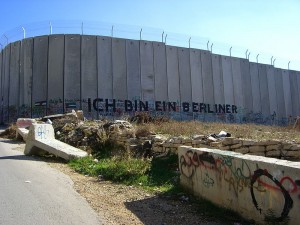Israel and the Water Card

The New York Times hailed Israel’s ingenuity in addressing its water needs, but played down how Israel exploits its military domination to divert water away from Palestinians and to Israelis, as ex-CIA analyst Paul R. Pillar explains.
Israel is the object of widespread admiration for its economic and technical accomplishments and the ingenuity that went into them — for being a nation that made the desert bloom. Much of the admiration is quite warranted, with Israeli talent and resourcefulness having not only produced blooms on kibbutzes but also a leading high-tech sector today.
The comparisons involved, however, usually leave unstated how much of the accomplishment rests on the prerogatives Israel has wrested for itself as an occupying power (not to mention the many billions of dollars through the years of U.S. assistance to Israel, which effectively has shifted burdens from Israeli to U.S. taxpayers).
A section of the barrier — erected by Israeli officials to prevent the passage of Palestinians — with graffiti using President John F. Kennedy’s famous quote when facing the Berlin Wall, “Ich bin ein Berliner.” (Photo credit: Marc Venezia)
Three years ago, presidential candidate Mitt Romney made a speech in Jerusalem that illustrated the kind of incompletely based comparisons that are typical. Referring to the disparity (which he actually understated) between the per capita gross domestic product of Israel and that of areas assigned to the Palestinian Authority, Romney’s explanation was: “Culture makes all the difference” — by which he meant that something akin to the Protestant work ethic drove Israeli enterprise but was missing from Arab culture.
He made no mention of the numerous physical, legal and resource impediments, within a few miles of where he was standing, to Palestinian economic activity that were part of the Israeli occupation, ranging from denial of building permits to prohibitions on Arab use of transportation networks. Of course, Romney’s motivation for saying what he did undoubtedly had something to do with the audience and pocketbooks to which he was appealing (he was speaking at a fundraiser attended by prominent Jewish-American backers).
Moreover, Romney is a very wealthy man who repeatedly demonstrated in other ways during the campaign his difficulty in comprehending the circumstances of those less well off. But his remarks suggested a view of Israel and the Palestinians that was both sincerely held and shared by many other Americans.
Even more to the point in understanding better the underpinnings of Israeli success are respects in which that success has benefited not only comparatively but absolutely from having conquered, and continuing to control, territory on which other people live. Israel has exploited resources in the Palestinian territories because it has the military strength to do so, with land being the most obvious and fundamental resource.
With control of the land, Israel enforces differential use of man-made as well as natural resources, to the benefit of Israelis and the detriment of Palestinians. The reserving of the best highways in the West Bank for use only by Israelis, for example, bestows an obvious benefit on Israelis in enabling them to conduct their business more efficiently, without being slowed down by any annoying Palestinian vehicles.
Think of this arrangement as HOT lanes in which who gets to use them is determined not by willingness to form a car pool or to pay a toll but instead by an occupying army that admits onto the entrance ramps only members of the favored ethnic group.
Among natural resources, water is vitally important and also involves Israelis benefiting absolutely as well as comparatively from their being an occupying power. That is why it is especially discouraging to read Isabel Kershner’s article in the New York Times about management by Israel of water resources.
Firmly in the blooming-desert tradition, the article is a laudatory piece about how through technology and shrewd regulation Israel has beaten a drought and taught the sort of lessons from which thirsty Californians could benefit. Half of the above-the-fold space on the Times front page is occupied by a picture of a sparkling blue hotel swimming pool against a backdrop of the barren Negev desert.
The article barely mentions how water has been a factor in conflict between Israelis and Palestinians, and even that brief mention may leave only the impression that Israel is living up to its water-related obligations in the Oslo accords and that Palestinians are whining about the price they have to pay for water. The caption of the main picture (of an aqueduct in the West Bank) accompanying the after-the-jump portion of the article says that “Israel shares a mountain aquifer with the West Bank, and provides water to the Palestinians.”
What the article does not say is that a major factor in Israel’s ability to beat droughts and to fulfill demand from its own citizens for water is that it uses its control over the Palestinian territories to consume, heavily and disproportionately, water resources from those territories — and in so doing, to deny those same resources to the Palestinians. This involves principally, though not exclusively, aquifers in the West Bank.
Of water currently being drawn from West Bank aquifers, Palestinian residents of the West Bank use only 17 percent. Jewish settlers in the West Bank use 10 percent, and the remaining 73 percent goes to Israel proper. The water problems of West Bank Palestinians are exacerbated by Israeli restrictions on drilling new wells and repairing old pipes. The Israeli-built wall in the West Bank, which lies east of some of the most exploitable parts of the mountain aquifer, eases settler and Israeli use of the nearby wells and separates many Palestinians from their traditional water supplies.
A similar pattern of use prevails with Jordan River water. As Kershner’s article notes, Israel extracts much of the water from the Jordan River system by moving it from Lake Tiberias to drier parts of Israel. Even though only a very small percentage of the Jordan River itself abuts Israeli territory and most of the river forms the boundary between the occupied West Bank and the kingdom of Jordan, Israel denies Palestinians any access to the river water.
The situation for residents of the Gaza Strip is even worse, and not only because of the damage to water infrastructure from Israel’s military assaults and blockade. Gaza depends for water on a coaster aquifer that straddles the boundary with Israel and in which the underwater flow is from east to west.
Israel has significantly reduced the amount of water that reaches the Gaza Strip by constructing a heavy concentration of deep wells on its side of the border. That Israeli upstream exploitation and the Palestinian drawing of what remains of the aquifer in the Gaza Strip have lowered both the level of the water table and water quality for Gazans, with much encroachment of saline sea water.
That swimming pool pictured on the front page of the Times is kept full not only because of Israeli ingenuity, although that is part of what is involved. It is full also because Israel uses its power over Palestinian resources to exploit them for the benefit of Israelis without regard for the deleterious effect on the Palestinians themselves.
The passionate American attachment to Israel has several roots, including well-founded admiration for Israeli accomplishments. But a further root is ignorance of many of the ways in which what may be admirable in what Israel has accomplished is based in part on policies and practices that are not. Management of water resources is but one example.
Paul R. Pillar, in his 28 years at the Central Intelligence Agency, rose to be one of the agency’s top analysts. He is now a visiting professor at Georgetown University for security studies. (This article first appeared as a blog post at The National Interest’s Web site. Reprinted with author’s permission.)


